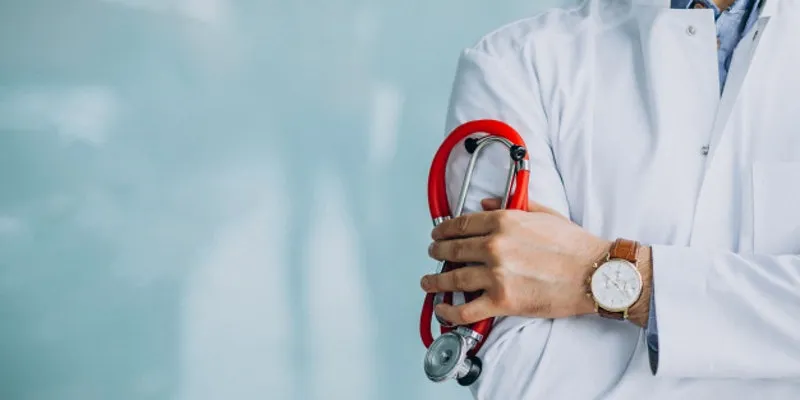Doctors are seeing a silver lining in the coronavirus pandemic. But what's it?
As the number of coronavirus cases in India rises, doctors say the pandemic is leading to a behavioural shift, and making Indians more aware and responsive to illness and health issues.
The first cases of a new coronavirus were reported in Wuhan, China, on December 31. A month later, the World Health Organisation (WHO) declared the outbreak a public health emergency of international concern. The COVID-19 pandemic has now spread across the world, with 14,652 deaths and 334,981, cases, according to the latest WHO figures.
Nearly 500 coronavirus cases have been reported in India so far, according to Health Ministry data.
But amid the gloom and doom, there seems to be one single silver lining: the pandemic has brought about a behavioural shift, making people more aware of their health.

a doctor holding a stethoscope
Dr Md Yosuf Muzaffar, Fortis, Gurgaon, says the coronavirus pandemic is leading many people with pre-existing conditions to realise that they are not invincible and schedule a checkup.
Delhi-based Avinash Mishra, 66, found out that he had a rare kind of asthma that needed immediate medical attention. He attributed the discovery to the fact that his son, scared of coronavirus, took him to the doctor for a checkup.
“I am a regular smoker. I was coughing severely for the last eight months, but did not go the doctor as I blamed it on Delhi pollution,” Avinash says.
“My son pushed me due to the coronavirus pandemic. The doctor suggested a corona test, but I also saw a pulmonologist and found that I have severe inflammation in the chest,” he says.
Avinash tested negative for COVID-19.
Dr Aprajeet Kar, a pulmonologist at BLK Super Speciality Hospital in Delhi, agrees that COVID-19 has brought about behavioural change.
“People are avoiding hospitals as they think they will catch the virus, but they have become more aware. There has been a behavioural change – instead of ignoring symptoms, people are paying heed and checking,” he says.
The death of a 21-year-old Spanish youth, Francisco Garcia, the coach of Atletica Portada Alta’s junior team in Malaga, after coming down with the coronavirus, showed that pre-existing conditions can be fatal along with COVID-19. Francisco had no idea that he had a form of leukaemia, which had previously been undiagnosed.
The head of a department at a government hospital in Delhi, seeking anonymity, agrees, saying the major cause of deaths in coronavirus cases was other serious health issues. Patients with a history of diseases like TB, cancer treatment, high blood sugar, and others are at greater risk.
“I am very happy to see that people are more aware of their health and immunity now. I hope this careful behaviour continues even after we eradicate COVID-19,” he adds.
Patients at higher risk
Dr Ravi Malik, former president of National Indian Medical Association, says COVID-19 is basically a “respiratory virus”, adding that patients with diseases like leukaemia , severe asthma, uncontrolled diabetes, and those on long-term steroids are at the greatest risk of contracting the virus.
But, he adds, that the outbreak has taught people the etiquette of coughing, sneezing, and social distancing.
“People in India have learnt respiratory hygiene. Many are wearing masks. This will not only help in combating COVID-19, but also diseases like TB, which kills more than five lakh people in India, and flu, which takes 60,000 lives a year,” he says.
Dr Santosh Kumar told YourStory that the test to check for coronavirus is based on polymerase chain reaction (PCR) techniques. “But current test kits are specifically made to test for the coronavirus family; they reveal if a person is COVID-19 positive or negative,” he says.
However, Dr Yusuf says some hospitals run the full PCR test, which helps in finding other diseases such as H1N1 or swine flu.
Dr Santosh says if the person turns out to be negative for COVID-19, it makes sense to test for other diseases.
Dr Yusuf agrees. “Every cough is not coronavirus, every sneezing is not coronavirus, and every fever is not coronavirus.”
Dr Ravi concludes that people need not panic but need to keep themselves aware and take precautions. The coronavirus threat is real, but only observing precautions can keep the disease at bay.
(Edited by Teja Lele Desai)








